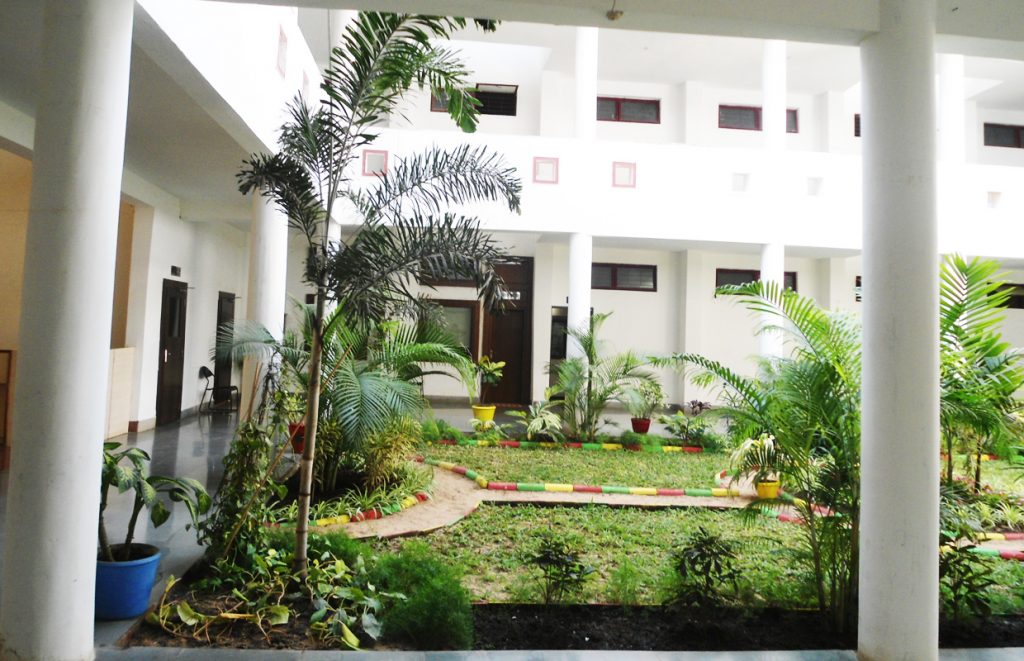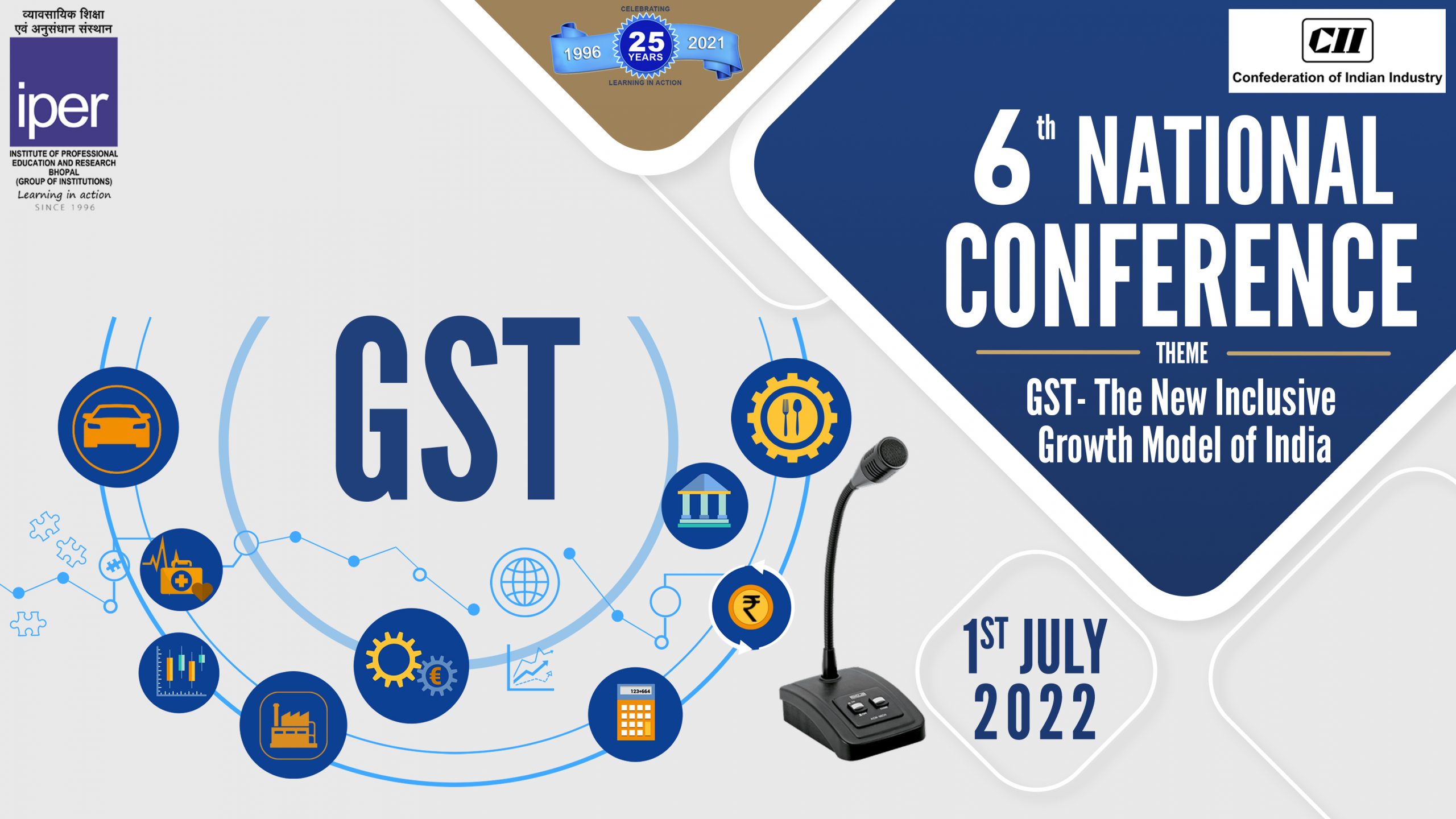

“GST – The New Inclusive Growth Model of India”
Globally, there is a clamour for creating a more inclusive world and India is also a frontrunner. Government of India is fully committed to its resolve towards achieving inclusive growth. To achieve this goal, efforts are being made to harmonise the national development priorities with international efforts and a number of policies, strategies, programmes / schemes and actions have been implemented at the national level.
Goods and Services Tax (GST) which was introduced in 2017 by replacing a host of other Indirect taxes is now showing its tremendous potential.
GST collections touched a record of Rs 1.40 lakh crore in January 2022 which is the seventh straight month when the GST collection has crossed the Rs 1 lakh crore mark. Besides this, it is the fourth time when the GST has crossed the mark of Rs 1.30 lakh crores since its inception.
GST collections pace is indicating an improvement in overall economic activities and as expected by economic experts, this positive trend in the tax collection will continue in the coming months as well.
We find that the GST is expected to raise overall Indian welfare and is projected to be an inclusive policy in that it would be welfare improving for all Indian states.
While India is still in the process of achieving its objectives, it is interesting to analyse how far has it reached compared to other countries and what could be the right policy improvements needed for achieving its target in terms of inclusive growth and sustainable development.
In this context, IPER Group of Institutions with CII (Confederation of Indian Industry) proudly announces its 6th National Conference on the theme “GST – The New Inclusive Growth Model of India” which is scheduled on 1st July 2022, will focus on the new opportunities brought in by the growing economy and how the inclusive growth model for India will take shape in days to come.
General Management:
- India and FDI.
- GST and Indian economy.
- Advancements in Digital India.
- Infrastructure Projects.
- International trade.
- Business Ethics
- Decision Sciences
- GST as Growth Aggregator
- Change Management
- In Sourcing /Outsourcing
- Expense Management
- Aggregate Demand & Supply
- Case Studies on the Implications of GST on different industries, products, services in Indian Context.
and other General Management topics, if any……
Finance:
- Fin-tech in the new normal
- Accounting standards and regulations
- Indian Financial System and Economic Development
- Financial Markets- Growth and Opportunities
- Capital flows to and from emerging markets
- Financial and Commodity Derivatives/ Financial Engineering
- Mutual Funds, Insurance and Other Financial Services
- Strategic Cost Management
- New trends in E-Commerce after GST
- GST implications in Inventory Management
- Financial, Social and Environmental Reporting
- Global Financial Crisis & impact on emerging markets
- Banking, Micro-financing and Financial Inclusion
- Analytics in Banking & Finance
- Sustainable Finance and Practices
- Financial Literacy
- Neuro Finance and Behavioral Finance
- Cryptocurrency and Blockchain Technology
- Contemporary issues in Accounting and Taxation Practices
- Forensic Accounting and Fraud
- Venture Capital
- Crowd Funding
- Disruptive Innovation
- Creative Accounting and Earnings Management
- Entrepreneurship & Family Business
- Disinvestment and Growth Strategy
- Taxation and Tax Reforms
- Ethics/Legal/Regulatory and Taxation Issues
- Interest-Free Banking/Islamic Finance/Banking
- Green Financing
and other Finance topics, if any……
Marketing:
- Product Prising
- Marketing Channels
- GST and FMCG Retail
- International Marketing
- Logistic & Supply Chain Management
- Effect of GST on Middle class income groups
- Advancements in Real Estate Sector
- Business to Business (B2B) Marketing
- Ethical Issues related with Business
- Changes in Tourism Industry/ Hospitality Industry
- E-Commerce
- Developments in Textile Industry
- Micro, Small & Medium Enterprises in current environment
- Digital Marketing
- Green Marketing
- Healthcare Marketing
- Content Marketing
- Role in Branding and Value Proposition
- Niche Markets in GST Environment
and other General Marketing topics, if any……
Human Resource:
- Recent Trends in Recruitment and Selection
- Skilling and Up-skilling in dynamic world
- Green Human Resource Management
- Organizational Redesign in VUCA world
- Employee Engagement
- Employee Wellbeing issues and Challenges
- Human Resource Analytics
- Challenges in the Digital Workplace
and other Human Resource topics, if any……

Publication Details
All selected abstracts and few selected papers will be published in a UGC approved journal/ book format carrying ISBN No. by Excel Publication, and few selected papers will be published in UGC Care listed Journal/Scopus index journal.
Submission Deadlines: –
| Submission of Abstract | 01st April 2022 |
| Full Paper Submission | 01st May 2022 |
| Registration Deadline | 20th May 2022 |
Paper Submission & Presentation Fees: –
| Research Scholars / Students | INR 250 |
| Faculty Members | INR 1000 |
| Corporate Practitioners | INR 1500 |
| Foreign Delegates | 50$ |
Participating / Attending Fees: –
| Research Scholars / Students | Nil |
| Faculty Members | INR 200 |
| Corporate Practitioners | INR 200 |

Guidelines & Specifications
Guidelines For Abstracts
- An abstract must focus on a topic related to the theme.
- All Submitted abstracts must have a title page, discipline, sub-theme of paper, the name(s) of the author(s), affiliation(s), complete address, of all the authors including phone, fax, e-mail address and biographical note(s) (max 100 words) of the authors(s).
- The abstract & full length paper should be sent through e-mail at the following E-mail ID: conference@iper.ac.in
Guidelines For Full Paper
- All Full Paper submissions must have a title page, discipline, sub-theme of the paper, the name(s) of the author(s), affiliation(s), complete address, of all the authors including phone, fax, e-mail address and biographical note(s) (max 100 words) of the author(s).
- The title of the paper must be written in bold capital letters using 14pt Times New Roman font. All sub-headings should also be written in bold capital letters. All authors will individual register & will receive an acknowledgement of the Full Paper, Registration Form and Registration Fees by E-mail, after the receipts of the same.
Specifications For Papers
Length : 3000-6000 words
Language : English
Spacing : Single
Font : Times New Roman
Font Size of text : 12
Margin : Half Inch (on all four sides)
General Guidelines
- All manuscripts should be professionally proof-read before the submission.
- The content should be original & unpublished work.
- IPER is not responsible for any claim made in any of the papers accepted for publication in the proceedings. The author(s) of each paper are solely responsible for the content, referencing of their paper are also responsible for ensuring that manuscripts they have submitted for publication in the proceedings have not been published elsewhere and contain no material previously published or written by another person, except when due reference is made in the text of the paper.
- The author must check the plagiarism of their research paper and send their report with paper.

Advisory Committee
| 1. | Prof. A.K Sharan | – | Professor – National Institute of Financial Management (NIFM), Faridabad, Ministry of Finance, Govt. of India. |
| 2. | Dr. K. Rangrajan | – | Professor & Head – Indian Institute of Foreign Trade (IIFT), Kolkata |
| 4 | Dr. R.J. Rao | – | Vice Chancellor – Barkatullah Vishwavidyalaya, Bhopal. |
| 5. | Dr. Kamlakar Singh | – | Chairman- Admission and Fee Regulatory Committee, Bhopal. |
| 6. | Dr. Vivek Sharma | – | Dean –Faculty of Management , Barkatullah University, Bhopal |
| 7. | Dr. P K Mishra | – | Former Vice Chancellor – DAVV, Indore & Former Vice Chancellor, Barkatullah Vishwavidyalaya, Bhopal. |
| 8. | Prof. S. Majumdar | – | Tata Institute of Social Sciences, Mumbai |
| 9. | Dr. Ashish Dongre | – | Principal – Govt. Polytechnic, Bhopal |
| 10. | Dr. A S Khalsa | – | Group Director – IPER Group of Institutions, Bhopal |
| 11. | Dr. Mahesh Soni | – | Professor – IPER |
| 12. | Dr. Vaibhav Lowalekar | – | Professor – IPER |
| 13. | Dr. Hersh Sharma | – | Professor – IPER |
Conference Committee
| 1. Dr. Harish Sudhir Kulkarni, (Conference Convenor) |
| 2. Dr. Trupti Dave |
| 3. Dr. Arjun Murti |
| 4. Dr. Ramandeep Kaur |
| 5. Dr. Abdul Rashid |
| 6. Prof. Rahul Kumar Choubey |

For Registration Contact:
(Dr.) Harish Sudhir Kulkarni, (Conference Convenor)
IPER (Technical Campus), Bhopal (M.P.) – 462026
Mobile No.:- (91) 9300816797 Email: conference@iper.ac.in
Telephone Number:- 0755-2706100,01
Mailing Address:- Opposite British Park, 11 Mile, Hoshangabad Road, Misrod, Bhopal (M.P.) 462026, India
IPER HELPLINE NO:- 0755-2706100,01 | Website: www.iper.ac.in
We look forward for knowledge sharing from your end. The organizing committee will also get in touch with you to solicit your response.
ABOUT BHOPAL:
Bhopal is the capital of the Indian state of Madhya Pradesh and the administrative headquarters of Bhopal district and Bhopal division. The city was the capital of the former Bhopal State (British India). Bhopal is known as the City of Lakes for its various natural as well as artificial lakes and is also one of the greenest cities in India. Bhopal, with its central location is very well connected to all the corners of the country. With the expanded planning area of 463 square kilometer. Bhopal stands among 15 largest cities of India. Since inception, Municipal Corporation of Bhopal has always been on a path of continual improvement by setting benchmarks in deliverance of services to the stake-holders.
In past few decades, Bhopal has witnessed major transformation in the subject of urban development. Bhopal is known to have one of the successful BRT Systems in country. By the virtue of being confident & aggressive in adaptation of technology, Bhopal is now in a position to implement many of the things which may otherwise be difficult. Bhopal is India’s greenest city. Bhopal has been declared the cleanest capital in 2019. Bhopal is famous for the State museum, Asia’s largest mosque Tajul Masjid, Bharat Bhavan, Shaurya Smarak, Van Vihar and Indira Gandhi Manav Sangrahlaya to name a few. With well-planned public transport, infrastructure, Institutes, Academic Hubs, IT Hubs, etc. Bhopal continues to maintain its rich cultural heritage.
How to Reach Bhopal by Air ?
Bhopal Airport is located about 13 km northwest well-connected to other major cities of the country like Chandigarh, Ahmedabad and Mumbai by regular flig available to reach the city centre.
How to Reach Bhopal by Road ?
Regular state run and private bus services connect Bhopal to Ahmedabad, Kota, Jodhpur, Nagpur, Shirdi, Pune, Jaipur, Amravati, Vadodara, Surat, Nashik, Indore and Mumbai.
How to Reach Bhopal by Train?
Bhopal Junction is the largest railway station in the city and is a major junction on the Delhi-Chennai main line and the Central railway route from Delhi to Mumbai. It connects Bhopal to all parts of the country.
